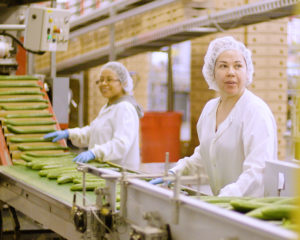 Since its unveiling last July, the Ethical Charter on Responsible Labor Practices has been endorsed by more than 40 companies, including retailers Albertsons, Costco Wholesale, Kroger, Sam’s Club, Walmart, Wegmans and Military Produce Group.
Since its unveiling last July, the Ethical Charter on Responsible Labor Practices has been endorsed by more than 40 companies, including retailers Albertsons, Costco Wholesale, Kroger, Sam’s Club, Walmart, Wegmans and Military Produce Group.
The Ethical Charter’s principles for professional conduct – covering dialogue with workers, inclusive management systems and a culture of continuous improvement – break new ground for the industry, yet the charter doesn’t address how grower-shippers should meet the expectations of endorsing retailers.
There is a definite competitive advantage to be had for early adopters of the principles outlined in the charter, as the principles align directly with growing consumer expectations for increased transparency.
 Recent consumer surveys show that many consumers are asking for increased transparency among food brands, especially fresh food. In fact, a study by Sprout Social found that human rights and labor issues ranked the highest among the top leading social issues that consumers want retailers and brands to address. Grower-shippers who find ways to bring more transparency to the supply chain will be addressing the needs of retail buyers even before those needs are specifically defined.
Recent consumer surveys show that many consumers are asking for increased transparency among food brands, especially fresh food. In fact, a study by Sprout Social found that human rights and labor issues ranked the highest among the top leading social issues that consumers want retailers and brands to address. Grower-shippers who find ways to bring more transparency to the supply chain will be addressing the needs of retail buyers even before those needs are specifically defined.
Workforce development programs offered by Equitable Food Initiative (EFI) help show compliance with the Ethical Charter while bringing key competitive advantages that create value in the long term. Here are some of the benefits grower-shippers in the EFI Program have noted:
- A Culture of Continuous Improvement Drives Business Performance. Farmworkers feel an increased sense of being part of a team, and the “us versus them” mentality is replaced with a continuous improvement approach, resulting in improved business performance from quality to efficiencies and productivity. “To engage the employees that actually do the work and let them feel that sense of involvement, I would say that pays huge dividends – not only to the employee through job satisfaction but also the productivity gains can be tremendous,” remarked Victor Smith, Chief Executive Officer, JV Smith Companies.
- Engaged Workers Lead to Improvements Across the Operation.
“Our employees were thirsting for an opportunity to provide feedback. We had feedback channels in place, but the level of engagement from our staff increased dramatically after we implemented the fundamentally bilateral structure that EFI brings with the Leadership Teams. The staff feel more empowered, more engaged in our business and that their voices matter. This has led to a tremendous amount of improvements in our business based on their feedback on simple things that wouldn’t have been obvious to us unless they brought them forward,” noted Kevin Doran, CEO, Houweling’s Group. - Employers Experience Better Retention and Easier Recruitment Even During Labor Shortages.
When farmworker voices are heard and their knowledge is respected and valued, a cultural change occurs that leads to both an increase in workers’ self-esteem and a decrease in turnover rates. As Kathryn Ault, Vice President of Customer Solutions at NatureSweet Tomatoes, noted, “We have the best associates in the industry – they are very productive. The talent pool that we are able to attract is very good, and as an organization this makes us much more effective because we are not spending an inordinate amount of time recruiting or training people.” - Supply Chain Collaboration Supports Long-Term Solutions.
EFI’s unique approach brings together every stage of the supply chain to collaborate on the produce industry’s most pressing challenges. “By relying on the relationships we’ve made through the EFI network, we were able to navigate issues that could have turned into full-blown crises. Bringing together multiple points of view has strengthened our business and our response to issues,” shared Ernie Farley, Partner, Andrew & Williamson Fresh Produce.
With so many large retailers endorsing the Ethical Charter, grower-shippers must begin evaluating the competitive advantages of embracing its principles. But in the end the Joint Committee on Responsible Labor Practices said it best – “responsible labor practices are the right thing to do, and our success as an industry depends on it.”
For more information on how EFI can help to implement principles from the Ethical Charter, contact business@equitablefood.org.

